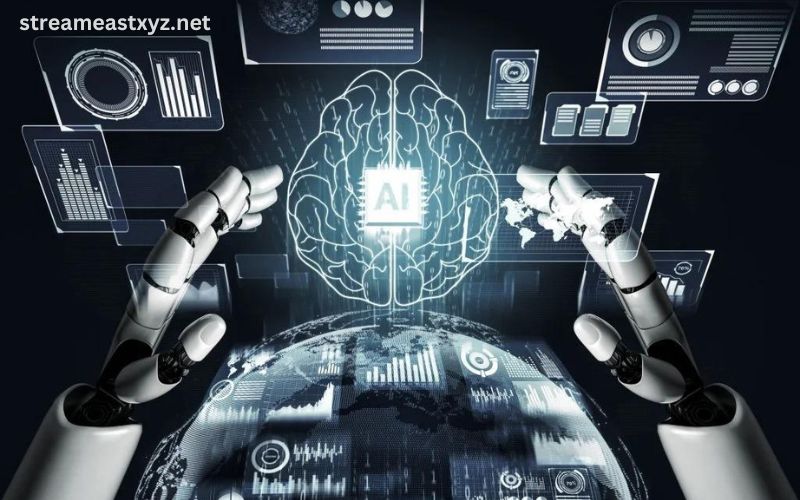You’ve likely heard the buzz about AI technology and its transformative power in the business world. But what exactly is AI? At its core, AI, or artificial intelligence, is the simulation of human intelligence processes by machines, particularly computer systems. These processes include learning, reasoning, and self-correction. AI technology encompasses a range of tools and techniques, such as machine learning, natural language processing, and robotics, each with the potential to revolutionize how you conduct business.
Diving deeper, AI is not a singular tool but a constellation of technologies that enable machines to act with a degree of autonomy. This means that, when properly implemented, AI can make decisions, carry out tasks, and even predict future trends based on data analysis. As you embark on the journey of integrating AI into your business, it’s crucial to understand the breadth and depth of its capabilities.
The advent of AI technology is not just a fleeting trend; it’s a fundamental shift in how industries operate. By leveraging AI, you can streamline operations, enhance customer experiences, and unlock new opportunities for innovation. Thus, it’s imperative to get acquainted with AI’s workings to fully harness its potential for your business.
Benefits of Implementing AI Technology in Businesses
Streamlining Operations
When you implement AI technology into your business operations, you unlock a world of efficiency. AI systems can automate mundane, repetitive tasks, freeing up your employees to focus on more complex and creative work. This not only boosts productivity but also improves job satisfaction among your staff. Furthermore, AI-powered analytics can optimize your supply chain, predict maintenance issues before they occur, and manage inventory with unprecedented precision.
Enhancing Customer Experiences
AI has the power to revolutionize customer interactions. Chatbots and virtual assistants, powered by natural language processing, can provide instant support and personalized communication to your customers around the clock. AI also enables you to analyze customer data, offering personalized recommendations and services that cater to individual preferences, thereby elevating the customer experience to new heights.
Driving Innovation and Growth
AI technology is a catalyst for innovation. By harnessing its data analysis capabilities, you can identify new market opportunities, tailor products and services to meet evolving needs, and stay ahead of the competition. AI-driven insights can lead to the development of new business models and revenue streams, ensuring your business remains relevant and competitive in a rapidly changing marketplace.
AI Technology in Different Industries
Retail and E-commerce
In the retail and e-commerce sectors, AI technology is a game-changer. It enhances the shopping experience through personalized recommendations and virtual fitting rooms. AI-powered inventory management systems ensure that stock levels are optimized, reducing waste and increasing efficiency. Additionally, predictive analytics can forecast consumer trends, allowing for more strategic marketing and product development.
Healthcare
The healthcare industry benefits immensely from AI technology. It assists in diagnosing diseases with greater accuracy and speed, and AI algorithms can analyze medical data to personalize patient treatment plans. Robotic surgeries, powered by AI, are becoming more commonplace, offering precision and reduced recovery times. AI is also pivotal in drug discovery, significantly reducing the time and cost associated with developing new medications.
Finance
In finance, AI is transforming the way you manage money. Fraud detection systems use machine learning to spot irregularities and prevent financial crimes. Robotic Process Automation (RPA) takes over repetitive tasks like data entry and compliance checks. Investment firms use AI for algorithmic trading, making split-second decisions on trades that no human could match for speed or efficiency.
Steps to Implement AI Technology in Your Business
Assess Your Needs and Goals
Before implementing AI technology, it’s critical to assess your business needs and set clear goals. Identify the areas where AI can have the most significant impact, such as customer service, sales, or operational efficiency. Establish measurable objectives to ensure that the integration of AI aligns with your overall business strategy.
Select the Right AI Technology
With a clear understanding of your needs, the next step is to select the appropriate AI technology. Research the tools and solutions that best match your goals, whether it’s a chatbot for customer service, machine learning algorithms for data analysis, or automation software for your supply chain. Consider factors such as scalability, compatibility with existing systems, and the level of support offered by the vendor.
Develop a Plan for Integration
Once you’ve chosen the right AI technology, develop a detailed plan for its integration into your business. This plan should include a timeline, budget, and resource allocation. It’s vital to have a cross-functional team that includes IT, operations, and other relevant departments to oversee the implementation process. Engage with stakeholders at every level to ensure buy-in and address any concerns that may arise.
Challenges in Implementing AI Technology
Technical Challenges
Integrating AI technology into your business is not without its technical challenges. These can include data quality issues, system incompatibilities, and the need for substantial computing power. Ensuring that your data is clean, structured, and accessible is crucial for AI systems to function effectively. You may also need to upgrade your IT infrastructure to support the demands of AI applications.
Ethical and Legal Considerations
AI technology raises ethical and legal considerations that you must navigate carefully. Issues such as data privacy, algorithmic bias, and the potential displacement of jobs due to automation are of paramount importance. Developing ethical guidelines and ensuring compliance with data protection regulations are essential steps in mitigating these concerns.
Cultural Resistance
Resistance to change is a common challenge when implementing new technologies. You may encounter skepticism or reluctance to adopt AI within your organization. To overcome this, it’s important to communicate the benefits of AI clearly and provide training to employees. Demonstrating how AI can enhance their work, rather than replace it, can help to foster a culture of innovation and acceptance.

AI Technology Tools and Resources
Machine Learning Platforms
Machine learning platforms are essential tools for developing AI applications. These platforms provide the necessary frameworks, tools, and libraries to design, train, and deploy machine learning models. Popular platforms include TensorFlow, PyTorch, and scikit-learn, each with its own strengths and community support.
Data Analytics Software
Data analytics software is indispensable for extracting insights from your data. Tools such as Tableau, Microsoft Power BI, and Google Analytics offer powerful visualization and analysis capabilities. By leveraging these tools, you can gain a deeper understanding of your business performance and customer behavior.
AI-Enabled Business Applications
There is a growing ecosystem of AI-enabled business applications designed to address specific industry needs. Customer Relationship Management (CRM) systems like Salesforce now incorporate AI to help you predict customer behavior and optimize sales strategies. Similarly, ERP systems are integrating AI for more intelligent resource planning and decision-making.
Case Studies of Successful AI Implementations in Businesses
Retail Giant’s AI-Powered Supply Chain
A well-known retail giant revolutionized its supply chain management by implementing AI. The company used machine learning to forecast demand, automate restocking, and optimize logistics. This led to a significant reduction in inventory costs and improved customer satisfaction due to better product availability.
Healthcare Provider’s Diagnostic AI
A leading healthcare provider adopted AI technology to enhance patient diagnostics. By utilizing deep learning algorithms, they were able to analyze medical images with greater accuracy and speed, identifying conditions that were previously difficult to detect. This innovation not only improved patient outcomes but also streamlined the diagnostic process.
Financial Institution’s Fraud Detection System
A major financial institution implemented an AI-based fraud detection system, which used machine learning to analyze transaction patterns and flag suspicious activity. The system dramatically improved the accuracy of fraud detection and reduced the rate of false positives, saving the institution millions in potential losses and bolstering customer trust.
Future Trends in AI Technology
Advancement in Natural Language Processing
Natural Language Processing (NLP) is set to become more sophisticated, allowing machines to understand and respond to human language with greater nuance and context. This advancement will improve virtual assistants and chatbots, making them more conversational and capable of handling complex customer service inquiries.
Growth of AI in Edge Computing
AI is moving towards edge computing, where data processing occurs closer to the source of data generation. This shift will enable faster decision-making and reduce latency, particularly in IoT devices and applications where real-time analytics are crucial.
Ethical AI Development
As AI technology continues to evolve, there will be a greater focus on ethical AI development. This includes creating transparent algorithms, ensuring data privacy, and addressing biases in AI systems. The goal is to build trust in AI applications and ensure they are used responsibly and for the greater good.
Hiring AI Professionals for Your Business
The journey to successfully implement AI technology starts with the people who will bring these systems to life. AI professionals are the architects and engineers of the AI world; they have the skills to design, build, and maintain AI systems tailored to your business needs.
Understanding the Importance of AI Expertise
You might wonder why you can’t just use off-the-shelf AI solutions or task your current IT team with implementing AI systems. The answer lies in the complexity and customization required for AI technology to truly align with your unique business needs. AI experts bring a depth of knowledge in machine learning, natural language processing, robotics, and cognitive computing, which are invaluable for creating bespoke AI solutions.
Where to Find AI Talent
Finding the right AI professionals is crucial. You can start by looking within your industry for professionals with a proven track record in AI implementation. Leveraging professional networking platforms like LinkedIn, attending AI conferences and workshops, or partnering with universities are all effective strategies to discover top AI talent.
Evaluating Potential AI Team Members
When evaluating candidates, look beyond their technical expertise. Consider their problem-solving skills, creativity, and ability to adapt to new challenges. They should also understand your business domain to build AI solutions that address your specific challenges. As AI is an interdisciplinary field, professionals who can collaborate with various departments within your company are particularly valuable.




